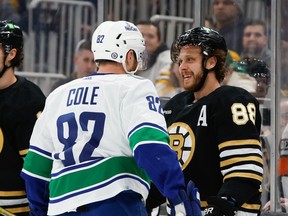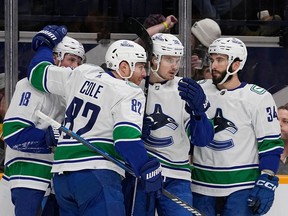Canucks: What is team toughness? Ian Cole knows keys to playoff success

[ad_1]
The veteran defenceman won Stanley Cup titles in 2016 and 2017 by not losing physical battles or losing his mind amid adversity

Article content
Ian Cole has been there, done that, and felt everything.
Advertisement 2
Article content
The veteran Vancouver Canucks defenceman won Stanley Cup championships in 2016 and 2017 with the Pittsburgh Penguins by not losing physical battles when push came to shove, not losing his mind amid adversity, and not parading to the penalty box.
Article content
It’s why the 35-year-old hockey lifer has been the voice of reason for current teammates, who wonder what awaits when the Canucks make their first NHL playoff appearance in four years.
It’s easy to explain the adrenalin rush and pitfalls of succumbing to immense pressure to perform. It is harder to endure the rocky road to hockey’s Holy Grail.
The ultimate test of collective mettle begs the question: What is team toughness? In today’s game, it’s not dropping the gloves. It’s not letting up.
Advertisement 3
Article content
“The playoffs are a war of attrition,” Cole stressed Monday. “It’s who makes the fewest mistakes and who’s going to play the hardest and longest. Every playoff starts with we’re going to get pucks deep and run guys.
“By Game 4 or Game 5, are you going to go for a puck but be a little timid? Are you a defenceman going back for a puck on the breakout and letting their guy win the race because you don’t want to get hit?

“To win a series you need skill and everything clicking, and you need to be able to get hit 30 times and get right back up. Team toughness is not being deterred, regardless of what the other team throws at you.”
And that often requires not taking the bait.
In 2017, the Penguins prevailed over the Nashville Predators in a six-game final series. The only Pittsburgh players to fight were Evgeni Malkin and Chris Kunitz. That doesn’t mean it wasn’t an edgy experience.
Article content
Advertisement 4
Article content
In Game 5, the teams combined for 24 penalties totalling 100 minutes because of hacks, whacks and misconducts.
Cole had 72 penalty minutes in 53 regular-season games that season, but just nine minutes in 25 playoff outings. He had to pick his spots because one power play can often determine the outcome of a tight post-season struggle.
“It’s so much different than just the one-off game during the season,” noted Cole. “Teams don’t feel it some nights and just pack up and head out.
“You can’t do that in the playoffs. Momentum feeds into each game. And even if you’re down four goals, you want to make a statement that we’re not going away easy.”
In a one-goal game, that’s tough. There’s a tendency for referees to let a lot more go in the playoffs. Do you want to cross that line and put your team at a disadvantage just to send a message?
Advertisement 5
Article content
“You want to be physical,” said Cole. “You can try to go stick on stick, but if a guy steps on yours, it’s a trip automatically. That’s the balancing act. That’s the tightrope.
“The adage is that refs put their whistles away, but I saw where more penalties are actually called in the playoffs.”
With everything ramped up and every play so critical, that’s not hard to imagine.
“It’s being able to keep your emotions and plug along,” added Cole. “That’s what we talked about in Pittsburgh. If you score, get scored on or take a bad penalty, just get back to it. It’s a real good mindset. It led to a sense of confidence.”
That’s what Cole has been preaching here. It’s getting the team game in order. But do the Canucks have all the elements to avoid a one-and-done playoff exit?
Advertisement 6
Article content
A post All-Star Game slide to 27th in goals per game (2.74), 23rd in shots per outing (28.4) and 23rd in power-play percentage (18.0) seems ominous. And so does a 5-5-1 record heading into Monday play since starting goaltender Thatcher Demko was sidelined by a knee injury March 9.
“If you go down the checklist, we have the personnel,” said Cole. “There’s confidence here in what we can accomplish. There’s going to be added pressure and a bigger spotlight. How will guys react to that? We’re fully capable of doing everything that it takes.”
Canucks head coach Rick Tocchet played in an era where playoff intimidation was imperative.
In the 1988-89 season with the Philadelphia Flyers, he had 45 regular-season goals and 183 penalty minutes. In the post-season, he was assessed 69 minutes in 16 games and fought just once.
Advertisement 7
Article content
And for a guy with 129 career bouts, it said something about doing everything to win a series and not something to lose one.
It’s why Tocchet’s message today is to not just to own the day, but play the right way. Team toughness is still in vogue, but it now means something more.
“It’s body position,” he said. “When you’re a team that’s hard to play against, you’re always in the way. Even guys like (Sidney) Crosby and (Nathan) MacKinnon are the best 50-50 battle guys in the league because they use their bodies first and then they go and get the puck.
“That’s the one thing we’re constantly learning here. We can’t go running guys. We’d like some big hits, but boxing out and being there for a rebound is what playoff hockey is all about.”
Advertisement 8
Article content
NEXT GAME
Canucks vs Coyotes
When/Where: Wednesday, 7:30 p.m., Rogers Arena
TV: SN Pacific. Radio: Sportsnet 650
Recommended from Editorial
Bookmark our website and support our journalism: Don’t miss the news you need to know — add VancouverSun.com and TheProvince.com to your bookmarks and sign up for our newsletters here.
You can also support our journalism by becoming a digital subscriber: For just $14 a month, you can get unlimited access to The Vancouver Sun, The Province, National Post and 13 other Canadian news sites. Support us by subscribing today: The Vancouver Sun | The Province.
Article content
[ad_2]

